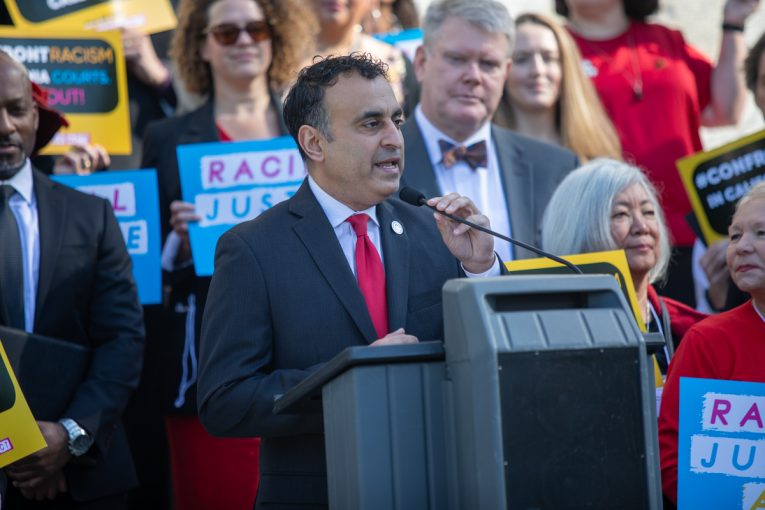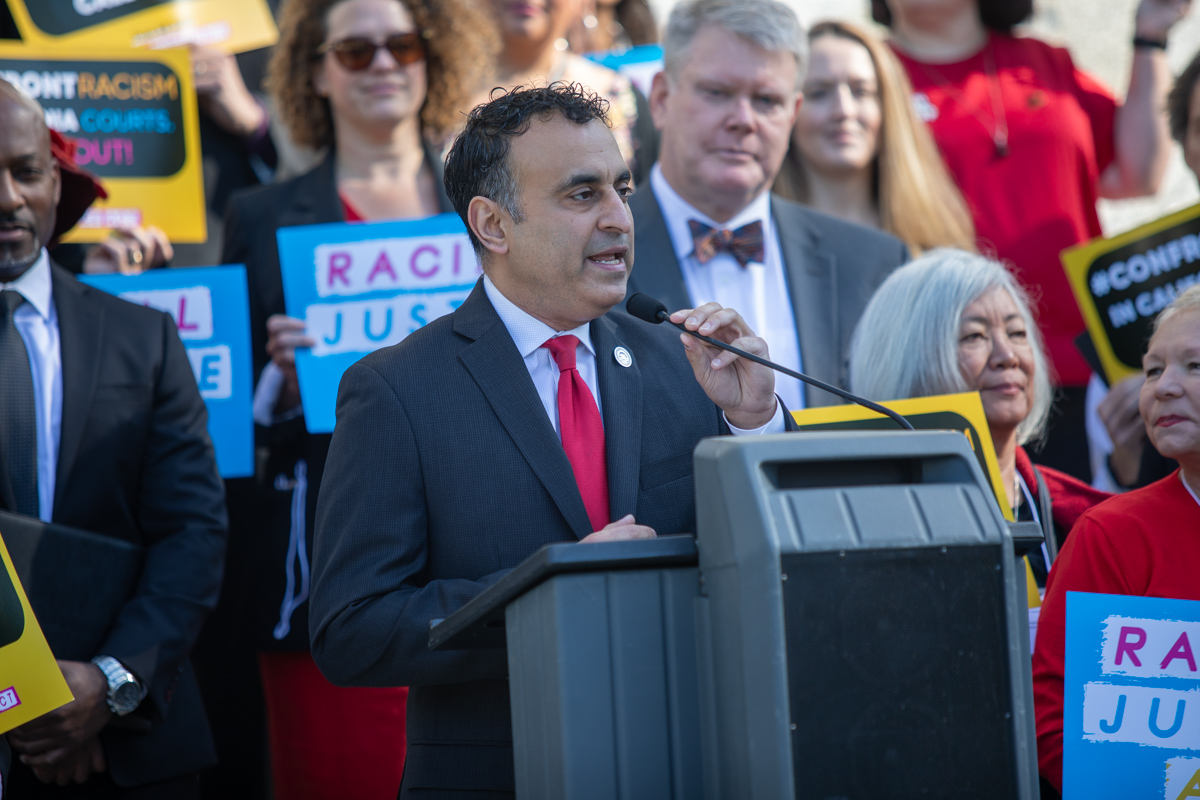

The California Racial Justice Act will prohibit the use of race, ethnicity or national origin in sentencing and convictions
The criminal justice system disadvantages people of color at every step of the process from arrests through sentencing. The Racial Justice Act attempts to address racial discrimination in both criminal convictions and sentencing.
Last week, the California Senate Public Safety Committee approved the California Racial Justice Act, which will assert civil rights in the California court system and address racial discrimination that leads to unfair convictions and sentencing. Authored by Assemblymember Ash Kalra (D-San Jose), Assembly Bill 2542 (AB 2542), the California Racial Justice Act, will now move forward to the Senate Appropriations Committee.
“Today’s passage of the California Racial Justice Act out of the Committee is an important step towards rooting out racism from our criminal justice system,”  said Assemblymember Kalra.
said Assemblymember Kalra.
He added, “Those in opposition say that this bill is impractical; I say that injustice is impractical. We cannot ignore what is happening in our society and continue to allow the court system to reflect racial biases that punish our Black and Latinx communities. If the current system has been created by design, then let us create a new design for our criminal justice system, a design that actually upholds justice and the Constitutional rights of equality for all Californians.”
Systemic racial disparities are pervasive in mass incarceration in California, where Black men are over eight times more likely to be incarcerated than white men. Nearly one hundred advocacy organizations across the state have urged support for the landmark bill to address systemic racism in the court system.
The Racial Justice Act would be the first in California that would prohibit the state from using:
- Explicit bias against a defendant based on race, ethnicity, or national origin
- Statistical disparities in charging, sentencing, and conviction
- Bias at trial and in jury selection
“California’s Civil Rights law clearly prohibits discrimination in housing, in employment, and public accommodation,” Assemblymember Kalra said at a press conference back in Marhc. “But nowhere in California law is there a clear statement that racial discrimination will not be tolerated in our criminal justice system.
“The opposite is happening right now,” the assemblymember stated.
“At a time when diverse communities all over the state and the nation are calling for the defense and protection of Black lives from state-violence, we cannot continue to ignore the racism that lives in criminal courts,” said Amber-Rose Howard, Executive Director of Californians United for a Responsible Budget (CURB).
“The California Racial Justice Act aims to directly defend Black lives by allowing California to confront systemic racism in the criminal legal system, which has devastated the Black community for far too long.”
“The California Racial Justice Act steps forward through the difficulty of these times to assert a truth too-long ignored: that systemic racism exists in our criminal legal system,” said Derick Morgan, Policy Associate with the Ella Baker Center for Human Rights.
“The Ella Baker Center is proud to be among the cosponsors of this bill to confront racism in our courts. Thank you to California’s advocates and policymakers for their continued efforts to meet the terrors of this moment, and those that fear-monger, with steadfast determination to uphold the dignity of our shared humanity.”
“For decades, we have been told by judges that racism in the criminal justice system is inevitable, unfixable, and even a ‘harmless error’; it is not.” said Natasha Minsker, policy advisor for Smart Justice California.
“By advancing the California Racial Justice Act, we can confront racism in the courts and address the harm done to individuals, communities and our state by persistent racial discrimination in the criminal legal system.”
At the March press conference, Alameda County Public Defender Brendon Woods pointed out that in Alameda County, ten percent of the population is Black, and yet you look at Santa Rita jail and it is disproportionately Black and brown.
“It is a monster,” he said. “Santa Rita Jail is 15 percent white, 48 percent black, 30 percent Latinx. This happens right here in California.”
Yet there is little protection in the legal system against such inequities.
He noted the 1987 Supreme Court case of McCleskey v. Kemp where Mr. McCleskey, a black man, was convicted of murdering a white police officer in Georgia and sentenced to death.
The case went to appeal and the appellate counsel looked at 2000 cases where they were able to show conclusively that a black person who kills a white person is far more likely to get the death penalty than the reverse.
“They showed that. It was clear. Not a question of a doubt,” he said. “The Supreme Court in that case said apparent disparities at sentencing are an inevitable part of our criminal justice system. Think about that.”
He said that the Supreme Court admitted that “sentencing was racist” and “there’s not a damn thing we’re going to do about it.”
“Well I disagree,” he said. “The Racial Justice Act is a step in the right direction to fix that.”
For years, discrimination in the criminal justice system has been written off as inevitable, unfixable or “harmless error,” however, Assemblymember Kalra argued “racial discrimination in the criminal justice system is not harmless.” Nor is it inevitable. “We can no longer accept racial bias in the criminal justice system as unfixable.
“We, who believe in justice, must confront racism in the courts,” he said.
The principal coauthors of AB 2542 are Senators Steve Bradford (D-Gardena), Lena Gonzalez (D- Long Beach), and Holly Mitchell (D-Los Angeles).
AB 2542 is sponsored by American Friends Service Committee, Asian Americans Advancing Justice, California Coalition for Women Prisoners, Californians United for a Responsible Budget, Ella Baker Center for Human Rights, the League of Women Voters of California, NextGen, and United Domestic Workers, AFSCME, Local 3930.
To sign up for our new newsletter – Everyday Injustice – https://tinyurl.com/yyultcf9

Isn’t all this already part of our laws?
This creates a much stronger stick to deal with the violation of the law.
Darn it, Keith O, you have provoked me to 80%+ agree with you… item one… yeah those are grounds for overturning convictions, at a minimum, re-trials… item 3… that should never be happening, but it is a ‘two-edged sword’… item 2… sounds like a ‘quota system’ to me..
It’s truly scary (tongue in cheek… but not THAT one) when you and I find common ground… but, could get used to it.
The legislation, as presented, is at best, “silly” meant for ‘political hay’ (a ploy for the last 3 months before elections?)… at worst, as Eric G pointed out, potentially expensive, and not practical…
Goals can be noble… like you, Keith O, thought we were already ‘there’… if not, we should strive for 1st and 3rd point… the 2nd seems like a bogus metric…
If we want to implement the 2nd, guess that we should never contact, arrest, charge, convict any POC… for ANYTHING…
I can’t argue with the premise or intent of this bill, but I can see huge problems in implementation—both practical and fiscal. I predict it will either be held in the Senate AppropriatIons Committee or, if it passes, be vetoed based on potentially enormous implementation costs.
Implementation is obvious, Eric… any result of any disparity in arrests, charges/prosecutions, jury findings, convictions, penalties, that can be statistically linked to gender, race, ethnicity, perhaps sexual orientation/identification, is wrongful! An abuse of ‘the state’.. and those that participate in any of that should be legally (criminal and/or civil) be held to account for that.
Costs? At what price for “justice”? Cost should not be the issue, according to the legislation… it’s about justice, and matching statistics!
Reminds me of a Malvina Reynolds song… or two…
I read this article twice, and I see nothing about the “how”, just a lot of fluffy words. The comment by DG had more substance than the article, and the answer seems to be that there will be a state requirement to set up local programs. In other words, more government will solve it. More lawyers and bureaucrats to solve the innate problems of the system.
When I was in my teens and early twenties, having come out of the civil rights movement, I was of course for affirmative action. Black people clearly needed a boost to get ahead in a society that had suppressed them for so long. Then in my mid-twenties I was assigned to do screening for hiring for a government contract that required affirmative action and minority owned businesses. I immediately ran into a sticky web of forms and empty bureaucracy, but worst of all shell companies ‘owned’ by black people and run by white people, the black ‘owners’ nothing but pawns so the white people could get a competitive advantage for their companies against other white companies. And no one even tried to hide it, they just laughed about it and seemed proud to have gamed the system.
That was just the start of a whole series of experiences that disillusioned me to well-marketed and seemingly well-meaning legislation that in reality caused more harm than good. What heartened me back then was that our private company, and many others, were hiring black, latino, gay, etc. people without any government programs, they were simply hiring the best people for the job, and I never saw anything that hinted at any -isms in hiring or preference.
I have never lost my sense that those disadvantaged should get a leg-up, but I have lost any hope that government legislation as the solution. These become make-work programs for government lawyers and bureaucrats. Abolishing outright discriminatory laws such as the civil rights act did was of course necessary. Beyond that, I have no confidence that government attempts at solutions to the hate and discrimination that exist within people’s hearts will not, overall, cause more harm than good.
The how would have been helpful – even in the law as written, the how is a bit vague.
Here’s a point for both Bill and Alan: McCleskey v. Kemp- basically Brendon is correct, the court was presented with tremendous evidence of the racial inequities involved in charging and sentencing someone to the death penalty, but the Supreme Court basically shrugged its shoulders. This law would allow you to present that evidence, file a writ, and potentially force the judicial system to have to reconcile that.
The other really good example is drug enforcement where Blacks and whites basically use and sell at similar rates, but Blacks face all of the penalties.
The overall population disparities are relevant, but there’s overlap: Some whites get harsh sentences, some Blacks get lenient ones. The practical issue is how you prove bias in an individual case.
Cleary true. Well, I’d alter ‘all’ to ‘heck-of-more’, but the point is clearly true.
Brendon Woods . . . . . Bretton Woods . . . . .
Hmmmmmm . . . . . Coincidence?